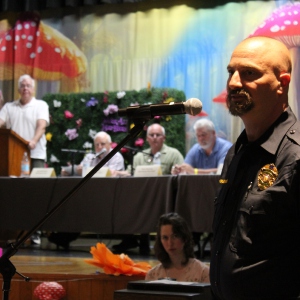Area schools draft policies on responding to ICE agents

Greenfield High School. Staff File Photo/Paul Franz
| Published: 02-05-2025 7:15 PM |
While there have been no Immigration and Customs Enforcement agents reported at schools in the region, district administrators around the county are laying out how schools will respond if ICE agents approach them.
The move to reaffirm district procedures comes on the heels of the Trump administration’s January reversal of policies prohibiting ICE and Customs and Border Protection agents from carrying out immigration enforcement in so-called sensitive locations, such as schools, hospitals and churches. Those policies date back to 2011 for ICE and 2013 for Customs and Border Protection, according to the Associated Press.
Those policy changes, as well as the surge of national discourse on the topic, have prompted the Frontier Regional and Union 38 school districts to state clear procedures, consistent with the law, in the event that an ICE agent comes to the door.
At those schools, if immigration law enforcement officials approach school employees, staff must immediately inform those agents that their requests will be processed through Superintendent Darius Modestow’s office. Any access to schools, he and other area superintendents said, requires a judicial warrant signed by a judge, not an ICE administrative warrant.
“There’s a lot of misinformation that’s out there and there’s a lot of fear based on this information,” Modestow told the Whately Elementary School Committee Tuesday evening, noting it is reasonable for community members to be concerned with so much information flying around. “In order for an ICE agent to come to a school, to even get an acknowledgment that such a student exists, they need to have a judicial warrant.”
A similar policy is in place at the Pioneer Valley Regional School District, Superintendent Patricia Kinsella said.
“We have a plan, we have coordinated with the chiefs of police and I’ve shared the plan with administration,” Kinsella said. “I don’t think anybody’s seeking to circumvent the law, but we will seek to ensure all applicable law is followed.”
The protocols those districts follow are similar to guidance issued by Massachusetts Attorney General Andrea Campbell on Jan. 24, which provides information about children’s right to free public education “regardless of immigration or citizenship status and the ongoing legal obligations of schools to ensure that appropriate steps are taken when responding to requests for access to students or their information by U.S. Immigration and Customs Enforcement agents.”
Article continues after...
Yesterday's Most Read Articles
If approached by ICE, Campbell’s office advises districts to “contact the district’s legal counsel to discuss the appropriate response before proceeding.”
Peter Cross, who chairs the Ralph C. Mahar Regional School District School Committee, said he attended a Massachusetts Association of School Committees webinar last week to learn about schools’ rights.
“ICE would have to have a judicial warrant, if they want to come into the school. They can’t have an administrative warrant,” he said. “They can’t intercept students coming from the school bus. That’s like kidnapping — you’re not allowed to do that.”
Cross said he has heard no whispers about ICE agents in the North Quabbin region.
“We shouldn’t even be having this discussion,” he said.
At the Jan. 28 Gill-Montague Regional School District School Committee meeting, member Heather Katsoulis brought up an email the state Department of Elementary and Secondary Education (DESE) sent regarding a webinar on immigration and students’ rights, prompting discussion about where the district stands on those rights.
The AG’s guidance states that school districts don’t need to collect passport information, visa information or Social Security numbers to check age or residency for enrollment purposes, as it creates the need for more data protection and risks deterring enrollment based on immigration or citizenship status. Gill-Montague Superintendent Brian Beck said that, based on this guidance, district staff updated school registration procedures to be consistent with the AG’s guidance.
In a phone interview Wednesday, Beck said he plans to share information on resources with families in need in coordination with Community Outreach and Family Engagement Coordinator Stacey Langknecht. Beck mentioned these resources include information related to immigration, as well as food and housing.
An email from Greenfield School Department Superintendent Karin Patenaude that was distributed to district families on Wednesday notes that the U.S. Department of Homeland Security has stated school grounds and school-related events should not serve as safe havens for individuals evading law enforcement and that ICE officers are expected to use discretion when determining whether to take action in these settings.
“Given these changes, we understand that many in our school community may have concerns about how schools should respond if ICE enforcement occurs on school grounds or at school-related events,” the email reads.
Patenaude mentions that ICE officers must check in at the superintendent’s office so their credentials and reason for visiting can be documented and they will be asked to wait while the legality of ICE access is reviewed. Parents or guardians will be notified if a student is the subject of enforcement actions and student records will not be shared with ICE without legal authorization. If ICE does not follow proper procedures, school staff will contact local authorities.
“We want to assure our students, families and staff that Greenfield Public Schools remains committed to fostering a safe, supportive and inclusive learning environment,” Patenaude wrote, providing links to resources with more information from the AG’s office and the Massachusetts Teachers Association. “Our schools will continue to operate in accordance with state law and district policies to protect students’ rights.”
U.S Rep. Jim McGovern, when asked Wednesday about immigration enforcement at schools in the region of Massachusetts he represents, said he feels schools should “be places of learning, not fear.”
“ICE has no business showing up at our schools. Ever. Period. Every child deserves a safe environment where they can focus on their education without worrying about their immigration status or that of their family,” McGovern said in a statement. “I strongly support policies that protect students and their families from unnecessary and harmful ICE enforcement actions in schools.”
Summing up districts’ moves Tuesday evening, Modestow cited Plyler v. Doe, a 1982 Supreme Court decision declaring states cannot deprive children from a free public education based on their immigration status.
“That’s the law we are under. … We’ve invited and told students to come here and they’re safe here,” Modestow said. “We will protect students in our schools and make sure their rights are upheld.”
Chris Larabee can be reached at clarabee@recorder.com. Erin-Leigh Hoffman can be reached at ehoffman@recorder.com. Domenic Poli contributed to this report.






 Two North Quabbin area veterans honored with Quilts of Valor
Two North Quabbin area veterans honored with Quilts of Valor Photos: A city abuzz
Photos: A city abuzz Bernarston voters approve paying off fire truck loan at Town Meeting
Bernarston voters approve paying off fire truck loan at Town Meeting ‘Always go for your goals’: 30 students achieve high school equivalency credentials in Greenfield ceremony
‘Always go for your goals’: 30 students achieve high school equivalency credentials in Greenfield ceremony
